Refine search
Actions for selected content:
23990 results in Ancient history
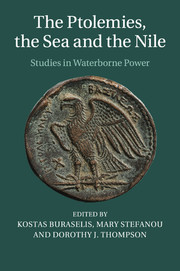
The Ptolemies, the Sea and the Nile
- Studies in Waterborne Power
-
- Published online:
- 05 June 2013
- Print publication:
- 04 July 2013
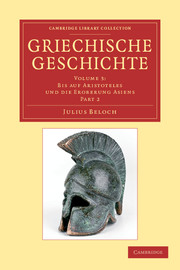
Griechische Geschichte
-
- Published online:
- 05 June 2013
- Print publication:
- 02 August 2012
- First published in:
- 1923
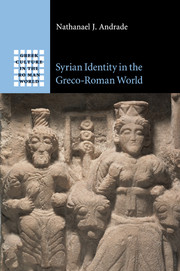
Syrian Identity in the Greco-Roman World
-
- Published online:
- 05 June 2013
- Print publication:
- 25 July 2013
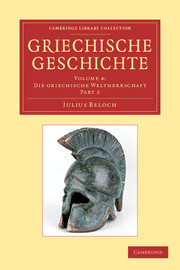
Griechische Geschichte
-
- Published online:
- 05 June 2013
- Print publication:
- 02 August 2012
- First published in:
- 1927
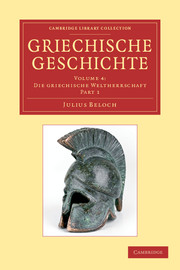
Griechische Geschichte
-
- Published online:
- 05 June 2013
- Print publication:
- 02 August 2012
- First published in:
- 1925
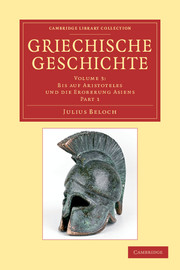
Griechische Geschichte
-
- Published online:
- 05 June 2013
- Print publication:
- 02 August 2012
- First published in:
- 1922
The Histories of Polybius
- Translated from the Text of F. Hultsch
-
- Published online:
- 05 June 2013
- Print publication:
- 02 August 2012
- First published in:
- 1889
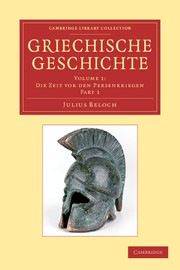
Griechische Geschichte
-
- Published online:
- 05 June 2013
- Print publication:
- 02 August 2012
- First published in:
- 1912
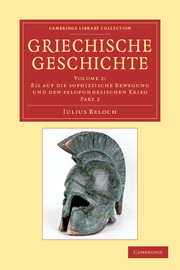
Griechische Geschichte
-
- Published online:
- 05 June 2013
- Print publication:
- 02 August 2012
- First published in:
- 1916
Glossary
-
- Book:
- Divination, Prediction and the End of the Roman Republic
- Published online:
- 05 May 2013
- Print publication:
- 09 May 2013, pp 279-281
-
- Chapter
- Export citation
Divination, Prediction and the End of the Roman Republic - Title page
-
-
- Book:
- Divination, Prediction and the End of the Roman Republic
- Published online:
- 05 May 2013
- Print publication:
- 09 May 2013, pp iii-iii
-
- Chapter
- Export citation
Dedication
-
- Book:
- Divination, Prediction and the End of the Roman Republic
- Published online:
- 05 May 2013
- Print publication:
- 09 May 2013, pp v-vi
-
- Chapter
- Export citation
Chapter 8 - Conclusions
-
- Book:
- Studying Gender in Classical Antiquity
- Published online:
- 05 May 2013
- Print publication:
- 09 May 2013, pp 158-159
-
- Chapter
- Export citation
Chapter 12 - Divination and monarchy
-
- Book:
- Divination, Prediction and the End of the Roman Republic
- Published online:
- 05 May 2013
- Print publication:
- 09 May 2013, pp 235-266
-
- Chapter
- Export citation
Index locorum
-
- Book:
- Divination, Prediction and the End of the Roman Republic
- Published online:
- 05 May 2013
- Print publication:
- 09 May 2013, pp 337-348
-
- Chapter
- Export citation
Acknowledgments
-
- Book:
- Divination, Prediction and the End of the Roman Republic
- Published online:
- 05 May 2013
- Print publication:
- 09 May 2013, pp x-xi
-
- Chapter
- Export citation
Bibliography
-
- Book:
- Divination, Prediction and the End of the Roman Republic
- Published online:
- 05 May 2013
- Print publication:
- 09 May 2013, pp 282-336
-
- Chapter
- Export citation
Chapter 6 - Alien sooth: the Sibylline Books
-
- Book:
- Divination, Prediction and the End of the Roman Republic
- Published online:
- 05 May 2013
- Print publication:
- 09 May 2013, pp 128-148
-
- Chapter
- Export citation
Copyright page
-
- Book:
- Divination, Prediction and the End of the Roman Republic
- Published online:
- 05 May 2013
- Print publication:
- 09 May 2013, pp iv-iv
-
- Chapter
- Export citation
Introduction - The power of signs
-
- Book:
- Divination, Prediction and the End of the Roman Republic
- Published online:
- 05 May 2013
- Print publication:
- 09 May 2013, pp 1-9
-
- Chapter
- Export citation
